Be thankful for the little things
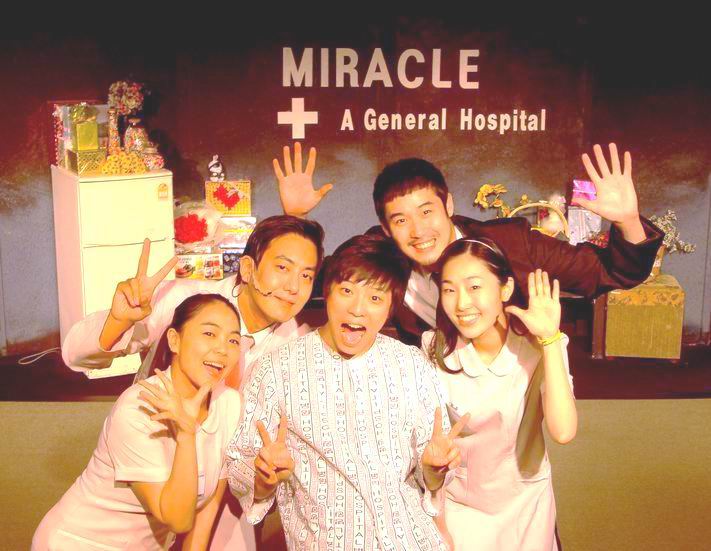 | ||
| Miracle's cast | ||
A seemingly typical hospital
The stage lights show the interior of a hospital. Called the Miracle Hospital, the place seems a little idiosyncratic, but not much different from any other hospital.
First there are the patients. Hee-dong, a previous member of an idol group, is bedridden and completely paralyzed because he is in a coma. The patient next door, Gil-dong, likes to drop in and out of Hee-dong’s room to steal his fan letters and presents. Then there is the medical staff. One doctor and two nurses take care of the patients, but hardly ever in a quiet manner. The comical nurse Misery has a crush on the narcissist and perverted Doctor, but he flirts only with another nurse named Ha-nee.
Though Hee-dong has been in a coma for six months, the hospital’s atmosphere is warm and full of hope that the patients will recover some day. “Based on the oath we took, we will work for your health with all our hearts!” sing the Doctor and his two nurses, dancing cheerfully in tandem.
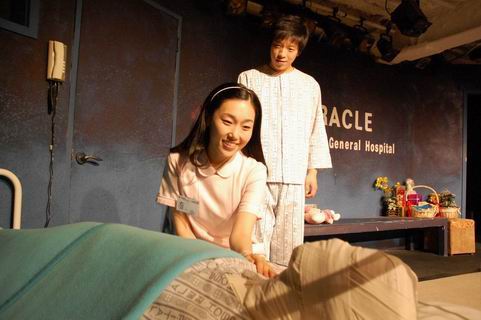 | ||
| Hee-dong's soul looks at Ha-nee taking care of his body | ||
Atypical patients
However, something is different about the patients at Miracle Hospital. No one seems to see or hear Hee-dong when he talks to them. No one can see Gil-dong either except Hee-dong. Together, they do all sorts of crazy things like scaring nurses by making objects float, or possessing other people’s bodies.
People cannot see Hee-dong and Gil-dong because they are souls, separated from the vegetable state of their bodies. Their bodies may be in coma, but the minds of the two are every bit alive. Hee-dong, for instance, sings of the beauty of the world, something he never noticed during his busy life as a singer. Right now what Hee-dong most longs to do is to express his feelings to Ha-nee, the sweet young nurse. He would do anything, Hee-dong says, to tell Ha-nee that he can hear her. His affection is most noticeable when he sings “I want to know you. Why have I met you now, when I cannot do anything for you.”
With Gil-dong’s help, Hee-dong tries to tell Ha-nee his existence through various ways: by writing letters, floating coins in the air, and getting inside the Doctor’s body for a few minutes. It is all very funny, especially since the souls of Hee-dong and Gil-dong are invisible to humans and they have supernatural powers like being able to borrow the body of other human. In the end, when Gil-dong and Hee-dong first find out they can see each other, and when Gil-dong tries to cover up his mistakes in order to not frighten Ha-nee are not only hilarious but also touching, because the characters’ emotions are so sincere and pure.
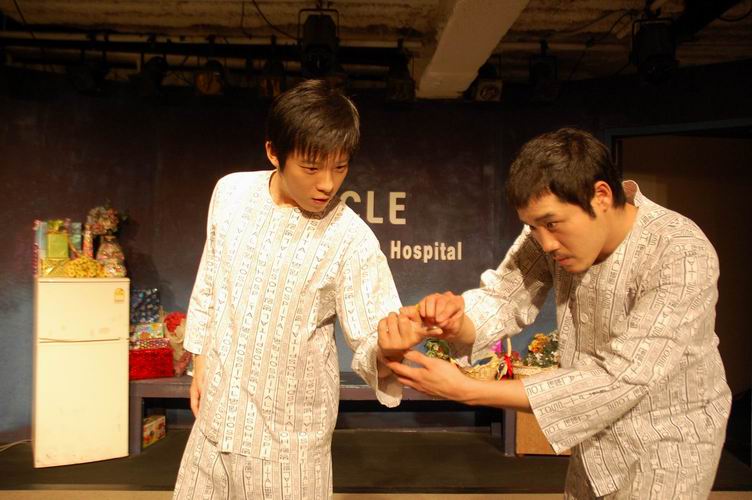 | ||
| The souls of Hee-dong and Gil-dong try to lift up a coin | ||
Life, death and fate
How do you draw a line between life and death? The life of a person in a vegetable state has always been an issue with euthanasia. Some argue that euthanasia allows the patient to leave the meaningless life hooked to machines (like the Doctor). Others (like Hee-dong and Gil-dong) argue that euthanasia is murder, for no one but God can decide whether a human should die or not.
Miracle shows the concerns around this problem very realistically as Gil-dong and Hee-dong’s health rapidly decline. Gil-dong used to be a happy father, husband, and doctor. That life crumbled when he fell into a coma four years ago. Now his family cannot afford his hospital fees any longer. Gil-dong faces inner conflict because though he wants to live, he cannot bear to continue to burden his family. His inner debate is noticeable when he says to Hee-dong that “There are no miracles. There is a 99.9% chance that we will never regain consciousness.” By touching on how the souls of patients in coma could be trying to “live” their life, it allows a fresh perspective to the controversy surrounding euthanasia.
But euthanasia is only one of the themes the musical deals with. Hee-dong and Ha-nee manage to see each other with Gil-dong’s help and the trust they had between each other. They spend time together talking about many things, such as the fact that they both have names of cartoon characters. The two overcome the fact that one of them might die any minute and try to make most of the moments that they have together - the duet they sing here is extremely beautiful. Thus Hee-dong gradually comes to understand an important truth; that he was able to meet Ha-nee at all was the real miracle.
* * *
As the musical says, “it is so hard to appreciate the best things in life until you have lost them.” Miracle lures the audience to look back at life’s seemingly small pleasures: things like sunshine, the scent of freshly cut grass, and most of all, the moments you spend with the people you care about the most.
Interview with Noh Jae-hwan, Gil-dong
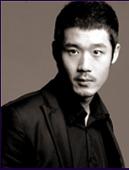 | ||
After playing both Hee-dong and Gil-dong, I learned that you have to be thankful for the people you meet every day. In the musical, both characters are no longer able to live normally. Before falling into a coma, they were both so busy with their lives, Hee-dong with his entertainment career and Gil-dong with his medical career. But once they get close to experiencing death, they find out that they should be thankful for the things they had previously taken for granted.
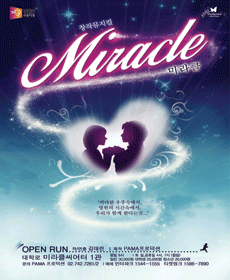 | ||
Title: Miracle
Genre: Musical
Place: Daehangno, Miracle Theater
Running date: ~Oct. 31, 2010
Price: ₩25,000(₩15,000 for students with Yonsei University student ID cards)

